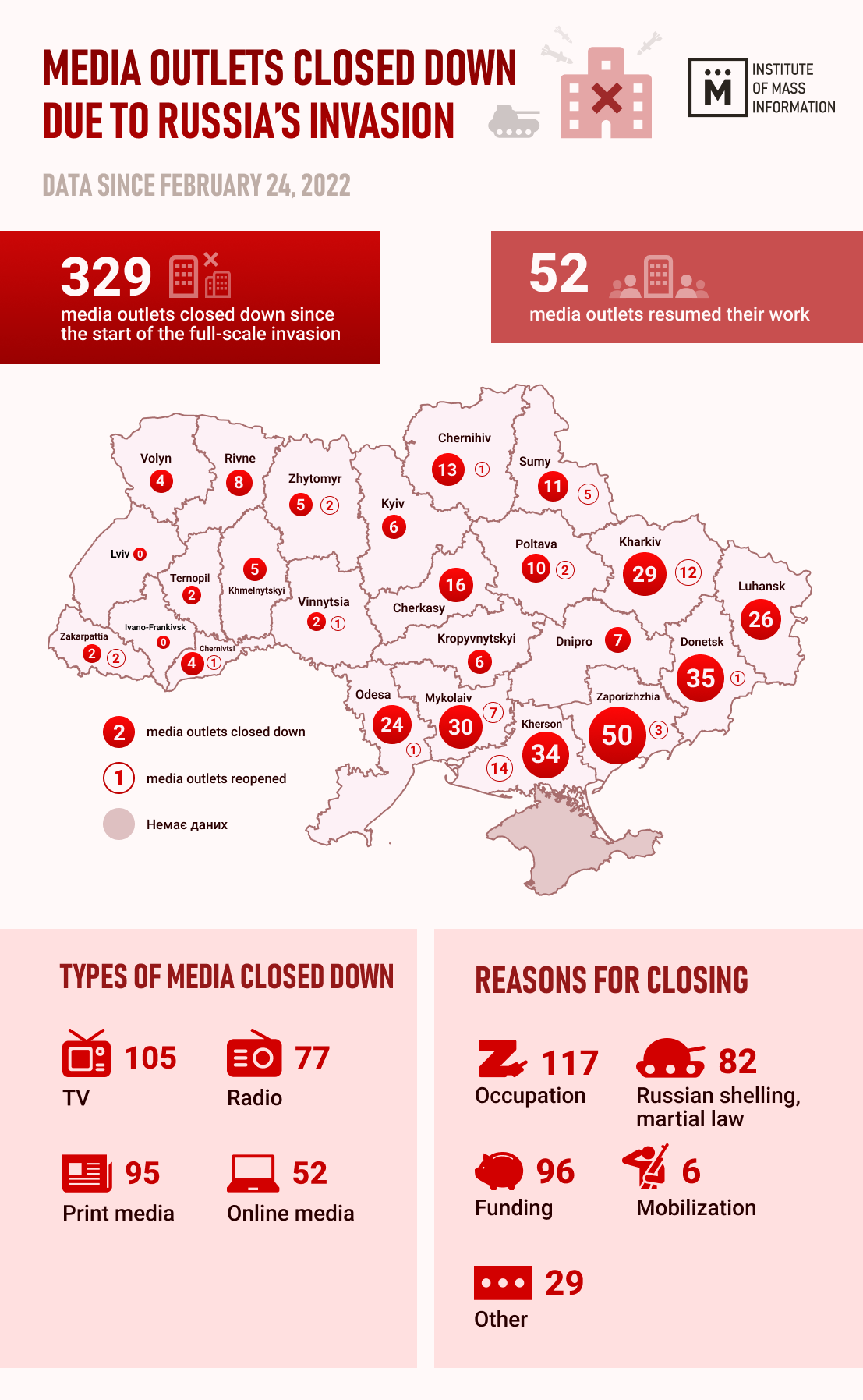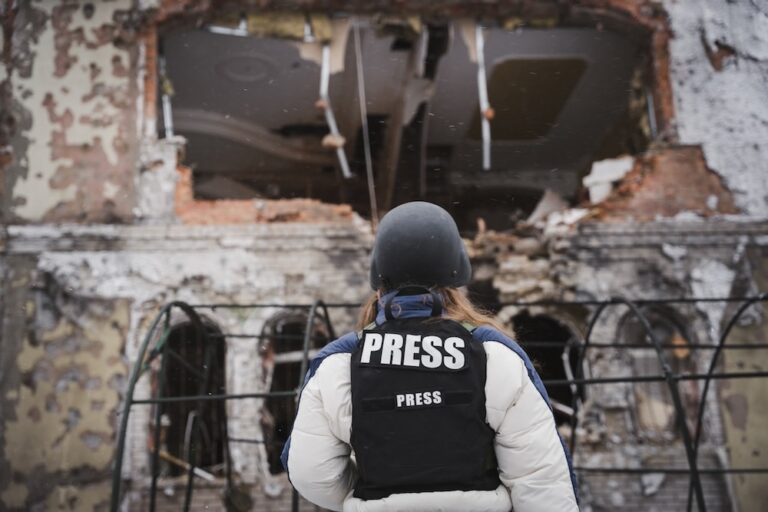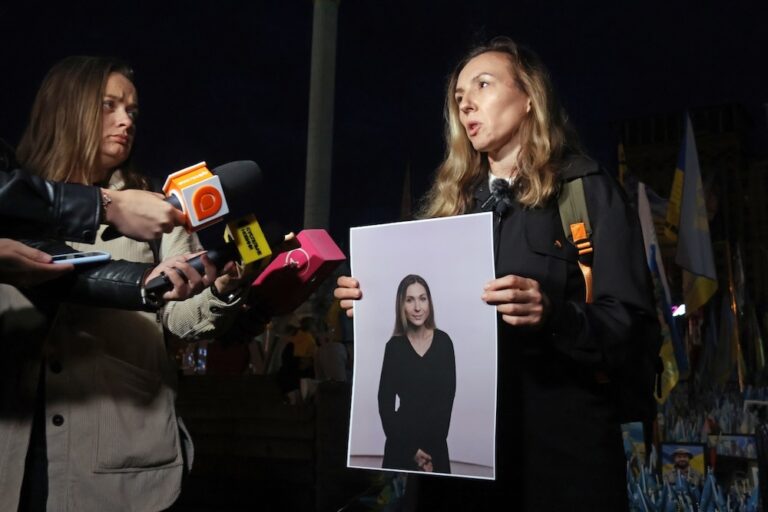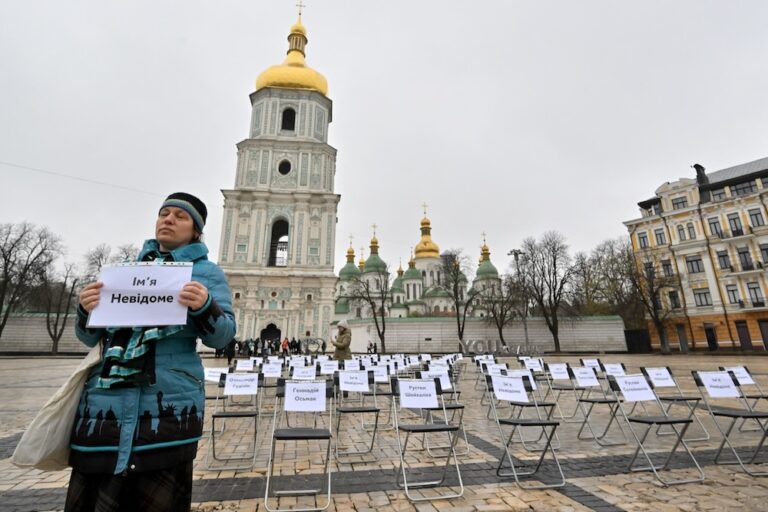The most common reasons for closing down were the Russian occupation of territories, which saw 117 media outlets closed, and financial difficulties caused by the war, which resulted in 96 closures.
This statement was originally published on imi.org.ua on 19 November 2024.
329 Ukrainian media outlets had to close down in the 1,000 days since the start of Russia’s full-scale invasion. Only 16% of them (52 media outlets) managed to resume their work, as evidenced by the data the Institute of Mass Information collected through their network on the ground.
The closure of media outlets has affected the oblasts close to the front line the most. In terms of the number of media outlets that closed down, Zaporizhzhia oblast (50 media outlets), Donetsk oblast (35), Kherson oblast (34), Mykolaiv oblast (30), Kharkiv oblast (29), Luhansk oblast (26), and Odesa oblast (24) ranked the highest. Overall, the IMI study showed that Russia’s war has led to the closure of media outlets in all oblasts except for two: Lviv and Ivano-Frankivsk (however, the IMI does not rule out that there have been such cases in these oblasts too, that the researchers are yet to hear about).

Media outlets that closed down due to Russia’s invasion. Diagram by the IMI
The most common reasons for closing down were the temporary occupation of territories (117 media outlets closed) and financial difficulties caused by the war (96 closures). For example, in Odessa oblast, 83% of the media outlets that closed down did so due to funding issues.
The third most common reason for closure was intense hostilities that made it impossible for journalists to work (82 media outlets were closed due to this).
29 media outlets reported closing down for other reasons, such as the journalists relocating, distribution issues, and being unable to work as they did before the war.
Interestingly, six media outlets stopped working due to their chief editors or managers being conscripted. These are two media outlets in Mykolaiv and Chernivtsi oblasts and one each in Kirovohradska oblast and Cherkasy oblast.
As for the types of media outlets that closed down, television suffered the greatest losses. According to the IMI, 105 TV channels shut down since the start of the invasion, which is 32% of all media outlets that have ceased operations. Print media ranked second with 95 newspapers going extinct (which is 29% of all media outlets that have shut down). The Russian invasion also resulted in the closure of 77 radio stations (23% of all media outlets that have closed down). Online media have suffered the least: 52 news websites have shut down, which is 16% of all closed media outlets.
Most media outlets that have managed to resume their work are located in Kherson oblast (14 media outlets), Kharkiv oblast (12), and Mykolaiv oblast (7). These media outlets mostly reopened after the previously occupied territories were liberated and the journalists returned to the area.
In the two years and eight months since the start of the full-scale invasion, Russia has committed 664 crimes against journalists and the media in Ukraine. The full monitoring study of Russia’s crimes against the media is available here.
To see the list of Ukrainian journalists deceased, click this link.
To see the list of Ukrainian journalists unlawfully detained by Russia, click this link.
The Institute of Mass Information (IMI) is a Ukrainian non-governmental media organization that has been operating since 1996. The IMI defends the rights of journalists, analyzes the media field and covers media-related events, fights propaganda and disinformation, and has been providing media outlets with safety gear for trips to the combat zone since the start of the Russo–Ukrainian war in 2014.
The IMI carries out Ukraine’s only freedom of speech monitoring and keeps a list of high quality and sustainable online media outlets, documents Russia’s crimes against the media committed in the course of the war on Ukraine. The IMI has representatives in 20 oblasts of Ukraine and a network of “Mediabaza” hubs to provide journalists with continuous support. The IMI’s partners include Reporters Without Borders and Freedom House; the organization is a member of IFEX.



